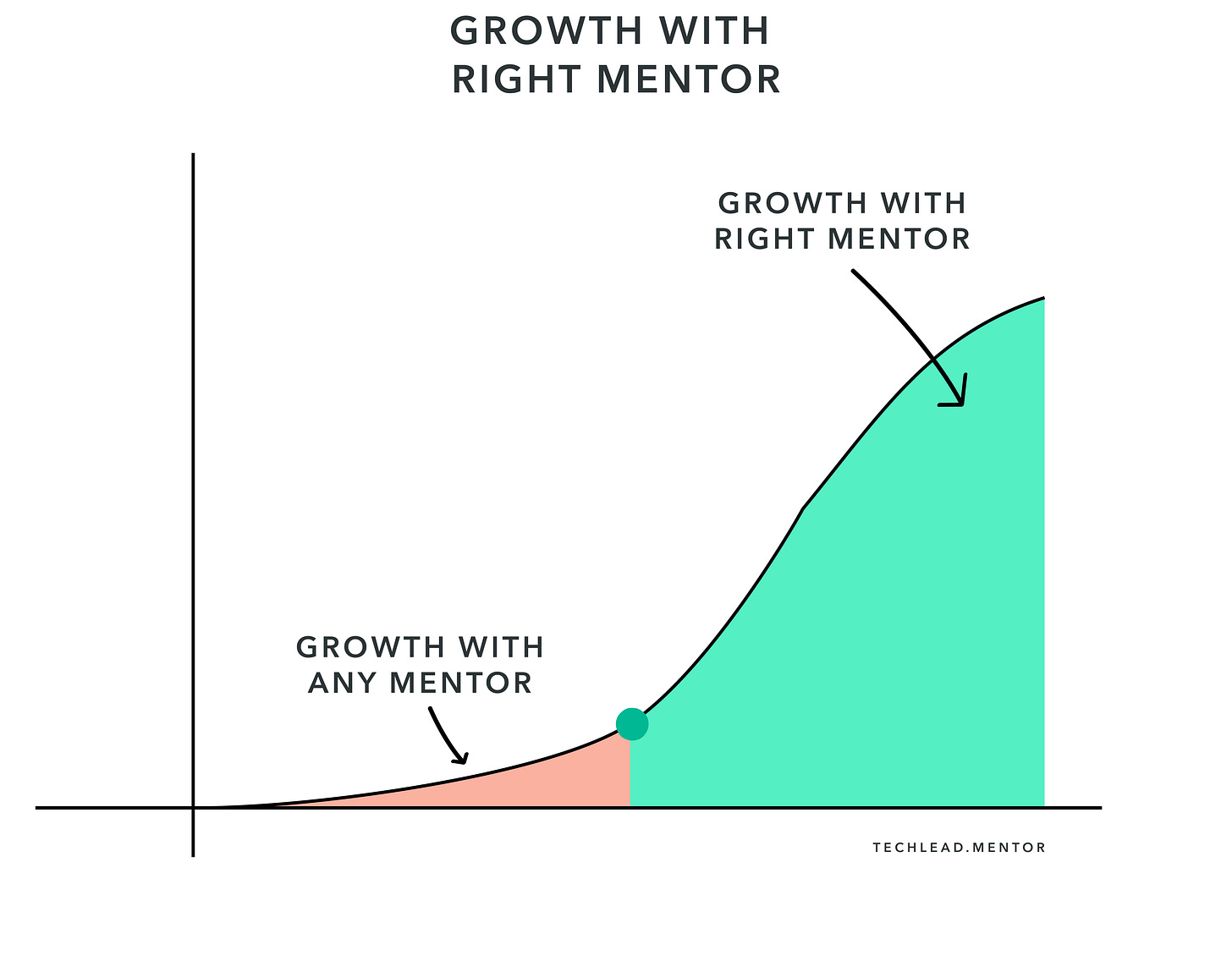How to Use Your Mentor Effectively?
5 things to enable your mentors to grow you.
What was the last big thing you discussed with your mentor? Was it a quick question about a task, or perhaps seeking feedback on a design document? While these interactions are valuable, they barely scratch the surface of what mentorship can offer. This approach, though common, often results in classic mentor under-utilization.
I will be honest, I used to think my struggles were unique and even feared sharing my shortcomings with mentors. Worse, I doubted anyone could truly understand or help me navigate them. Also, I thought some problems were meant to be solved on my own. This perspective, as I discovered later, stunted my growth.
Today, I will share 5 steps to use your mentors as a catalyst for exponential growth.
🚀 1. Share your Aspirations
Build a relationship with your mentors. If you only use them for transactional questions then they can’t help you with your long-term goals. When you share your aspirations, they can break them down into incremental goals.
For example, if you aspire to be an industry expert in a domain, they can show you
Which areas to focus on
Which conferences to attend and topics to present
Which engineers, outside your company, to get in touch with.
Other such non-obvious aspirations where mentors can help you: improve communication skills, do more cross-team presentations, learn project management skills, problem-solving skills, upward management, etc
🔍 2. Pick the right mentor
A common myth is you are stuck with a single mentor! That is not only far from the truth but also limiting your growth. Also, not every mentor has the experience to help you with all your problems.
Think about it,
When you want to be the tech lead, you need guidance from someone who’s done it before and not from your onboarding buddy.
If you want help with writing, you will seek help from someone who writes good documents.
Another common myth is trying to find the smartest engineer to be your mentor. Note, that smart engineers ≠ great teachers. Once you find the right mentor, your growth trajectory will change.
If you don't know how to find the right one, ask your manager.
😣 3. Highlight your Struggles
I was too afraid to share my struggles. I thought others would judge me and I was ok with struggling silently. But, I observed the top performers always acknowledged their lack of knowledge. That enabled them to learn faster.
When you talk about your struggles, it eliminates the guessing game for your mentor. They understand what’s going on with you and can give you actionable advice. I learned that most leaders want to help you, but they can't if they don't know you need help.
For example, I used to overthink my responses in larger meetings.
I didn’t acknowledge my hesitation but blamed it on external factors.
However, once I shared that I worried about sounding stupid, I got actionable tips.
I still remember this, “Others remember the 3 out of 10 correct things we say, but we always remember that 1 out of 10 wrong things.”
🕶️ 4. Ask them about your blind spots
It can take you years to find your blind spots but your mentors can point them out after a few interactions. I have been on both sides of this - as a mentor finding blind spots for others and as a mentee being helped. So, I understand the magical feeling of someone teaching you to solve your life-long struggles.
For example, a manager asked for feedback about one of their reports, but I hesitated and gave a vague response. My TL caught this and shared how giving direct feedback was part of being a leader. I used to say things like “It would be great if they could do XYZ” instead of “They haven’t delivered and <its impact>”. If my TL hadn’t found this blind spot, I wouldn’t have learned that my feedbacks were weak.
Good mentors have gone through the struggles themselves. So, they know the common blind spots and what tips will help you. They see what you don’t!
🌟 5. Learn how they do it
While their guidance can 10x your growth, learning how your mentor does things can 100x it. Ask them if you could be a fly on the wall when they do things.
For example, I learned a lot about building alignment when I observed a very senior engineer handle a difficult situation. This situation lasted for multiple weeks, so I had many instances to learn from. In discussions:
They managed their impulse by using silence and not rushing to answer.
They didn’t sugarcoat when they disagreed and provided concrete reasons. That felt too direct to me, but it was pivotal in bringing everyone onto the same page.
This experience helped me introspect my shortcomings and unlocked my hidden leadership skills.
Parting Note
Acknowledging that I needed help with unconventional things like writing, building alignment, managing upwards, etc. was the pivotal point in my career that grew my leadership skills. Many engineers struggle to ask for the help they need and I hope this article shows the way.
Hit the ❤️ button. You may think, what difference would that make?
It tells me you found it insightful else I have no way to know. Also, make sure to 🔁 share this post it if others will benefit from it.
If I miss my article next week, that’s because I am busy with filing taxes. It’s tax season here in the US and the April 15th deadline is approaching.





I think of my PI as my mentor but I haven't really established a relationship with him, just transactional stuff like you said.
I'll try to improve that thanks Raviraj
Would love to see How to Use Your Mentee Effectively as well.